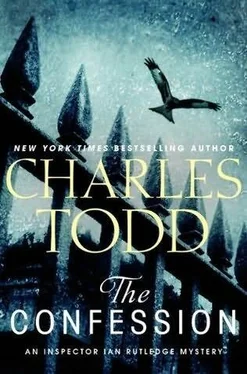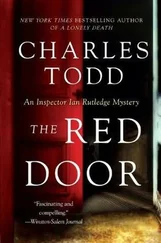Charles Todd - The Confession
Здесь есть возможность читать онлайн «Charles Todd - The Confession» весь текст электронной книги совершенно бесплатно (целиком полную версию без сокращений). В некоторых случаях можно слушать аудио, скачать через торрент в формате fb2 и присутствует краткое содержание. Жанр: Полицейский детектив, на английском языке. Описание произведения, (предисловие) а так же отзывы посетителей доступны на портале библиотеки ЛибКат.
- Название:The Confession
- Автор:
- Жанр:
- Год:неизвестен
- ISBN:нет данных
- Рейтинг книги:5 / 5. Голосов: 1
-
Избранное:Добавить в избранное
- Отзывы:
-
Ваша оценка:
- 100
- 1
- 2
- 3
- 4
- 5
The Confession: краткое содержание, описание и аннотация
Предлагаем к чтению аннотацию, описание, краткое содержание или предисловие (зависит от того, что написал сам автор книги «The Confession»). Если вы не нашли необходимую информацию о книге — напишите в комментариях, мы постараемся отыскать её.
The Confession — читать онлайн бесплатно полную книгу (весь текст) целиком
Ниже представлен текст книги, разбитый по страницам. Система сохранения места последней прочитанной страницы, позволяет с удобством читать онлайн бесплатно книгу «The Confession», без необходимости каждый раз заново искать на чём Вы остановились. Поставьте закладку, и сможете в любой момент перейти на страницу, на которой закончили чтение.
Интервал:
Закладка:
He was reminded of something. Something Inspector Robinson had said while reviewing the terms of the Fowler wills.
It came back to him then. That Mr. Fowler had supported a charity school in London over the years. An odd choice of interest for a young bachelor reading law.
“Did you keep in touch with the family after the house was closed?”
“Mr. Russell wrote to me once or twice, and Mr. Justin wrote to me before he was sent to France. They were young men, I wasn’t surprised that there were no more letters after that.”
“Did you know Mrs. Broadly was dead?”
“Yes, sadly, her sister wrote to me.”
“Did Harold Finley survive the war?”
“I don’t believe he did. He wrote to me quite a few times. Very pleasant letters they were too. He came to see me in early summer, 1915. He’d been wounded- when the caisson he was in charge of was blown up, it crashed into his leg, breaking it. I thought he looked tired and still in pain, with a nasty limp. He said he was eager to get back to France. I wished him well. That was the last I heard from him.” She picked up her pen and put it down again. “I was very fond of him. If I’d been blessed with a son, I would have wished to have one just like Harold.”
“Where did he come from?”
“He was from Norwich, I believe. You haven’t told me why you are reopening the inquiry into Mrs. Russell’s disappearance. Or why Scotland Yard should take an interest in it.”
He decided to tell her the truth, about Ben Willet and his visit to the Yard as Wyatt Russell.
“That’s Ned Willet’s boy, isn’t it? The fisherman. But why should he do such a thing? I can’t believe it.”
“He was found dead a fortnight later, and he was wearing this.” He handed her the locket.
After looking at it, she raised her eyes to his. “It’s Mrs. Russell’s. But that’s not the photograph she kept in it.” She was silent, then she said, “He couldn’t have killed her. He was only a boy .”
“A gold necklace must have been tempting even to a boy, when his family was struggling to keep food on the table.”
“But he kept it, didn’t he, he didn’t buy bread with it.”
When Rutledge said nothing, she added, “If he’d killed her, then Mr. Wyatt or Mr. Justin would have killed him, if they discovered it. What I don’t understand is, if it was one of them-Mr. Wyatt or Mr. Justin-why did they leave this locket on his body when they knew how much it meant to her?”
Hamish spoke for the first time. “Because,” he said, his voice so clear in Rutledge’s mind that it seemed to come from just behind his shoulder, where the young Scot had stood so often during the long watches in the night, “he knew the police would gie it back to him.”
Chapter 20
Calling on Mrs. Dunner had been profitable. Rutledge drove to his flat, unpacked his valise, and sat by a window, watching the moths dance futilely around the lamp on the table at his elbow.
He could feel another storm building, and it suited his mood.
The housekeeper’s words echoed in his mind.
What I don’t understand is, if it was one of them-Mr. Wyatt or Mr. Justin-why did they leave this locket on his body when they knew how much it meant to her?
There was another possibility, that the body had gone into the Thames before the locket could be removed. Someone could have come along just after the killer had emptied the dead man’s pockets, and the only choice was to let the locket go.
Had Justin Fowler accused Willet of the murder? If so, Willet had had to kill him. And then he had attempted to clear his own name before dying of his cancer by putting the blame squarely on Wyatt Russell.
That at least would go a long way toward explaining the false confession.
Cynthia’s pet…
Wyatt Russell’s words. Was Willet cold-blooded enough to kill Cynthia Farraday’s foster mother as well as the man she had grown up with, and still faced himself in the mirror after all Miss Farraday had done for him?
Hamish said, his voice almost inaudible in the rumble of distant thunder, “Sandy Barber killed him to spare his father and sister.”
It could be true, if Willet had changed so very much. Kill him before he could come home to Furnham and reveal his true character.
That begged the question of who had tried to kill Wyatt Russell.
Perhaps it wasn’t Sandy Barber who had killed Willet. Jessup was fond enough of Abigail to have done the deed to spare her. He too was in a position to intercept any message from the prodigal son. And he could have known more about the book published in France than he’d told anyone.
Whichever way he turned what he knew, Rutledge found that one piece always failed to fit into the puzzle.
Hamish said, “If Willet’s murder was blamed on Wyatt, then someone wanted revenge.”
And that made sense.
But Rutledge wasn’t satisfied.
He watched the storm break over London, watched trees along the street bend before the sudden wind as lightning shattered the darkness and thunder rolled like cannon fire.
There was enough evidence to make an arrest, and Superintendent Bowles would argue that it was the role of the court to sort it all out.
Rutledge had always seen justice differently, that it was the policeman whose duty it was to sift the evidence and bring in the guilty party, while the courts judged whether or not the facts as presented supported punishment according to the law or the release of the accused without prejudice. A test, as it were, of truth. The rector hadn’t understood that. Even Mrs. Channing had once questioned why he had chosen the police over following in his father’s footsteps in the firm of solicitors.
Old standards died hard. Many people still expected a policeman to come to the servants’ entrance where he belonged. But that was the view of a generation ago, and it was changing.
Hamish said, breaking into his thoughts, “You must decide. Which man took the law into his ain hands?”
Jessup? Who had always believed that Ben Willet had made the wrong choice when he left his family and his village? Or Sandy Barber, who loved his wife and would protect her at any price?
There was still no answer.
The next morning Rutledge set out early, driving through rain-washed streets to stop briefly in the Yard. There he put in a telephone call to Mr. Harrison, the solicitor handling the affairs of the late Mr. and Mrs. Fowler.
When Mr. Harrison was brought to the telephone, Rutledge asked what charitable school for boys the Fowlers had supported.
“It’s the Jamison Baldridge School,” he replied. “Before seeing to the disbursement of the bequest, I took the opportunity to inquire about them. Mr. Baldridge was an MP and close friend of William Gladstone, who encouraged the childless Baldridge to donate large sums to a charity school in London. It’s soundly funded and responsibly managed. And so we carried out the elder Mr. Fowler’s wishes.”
“What was Fowler’s interest in it?”
“I’m afraid he never told me. He had begun supporting it before he returned to Colchester.”
“What sort of school is it?”
“It is for poor boys without reference to religion, only need and ability. It has a high scholastic standard, and most of the boys have gone on to do well in life. Several have served in the Metropolitan Police, a number went to the Army, there’s a clergyman or two, many became teachers, and a few have even gone into service.”
“Into service?” Rutledge was surprised.
“One was a valet to a cabinet minister. Another became an estate manager in Scotland.”
“And their failures?” Rutledge asked.
“I was led to believe that they did very well too,” Harrison replied dryly.
Читать дальшеИнтервал:
Закладка:
Похожие книги на «The Confession»
Представляем Вашему вниманию похожие книги на «The Confession» списком для выбора. Мы отобрали схожую по названию и смыслу литературу в надежде предоставить читателям больше вариантов отыскать новые, интересные, ещё непрочитанные произведения.
Обсуждение, отзывы о книге «The Confession» и просто собственные мнения читателей. Оставьте ваши комментарии, напишите, что Вы думаете о произведении, его смысле или главных героях. Укажите что конкретно понравилось, а что нет, и почему Вы так считаете.












